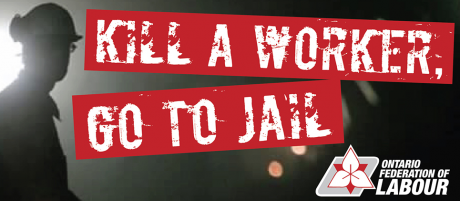News
You are here
Kill a worker, go to jail

January 21, 2016
On Christmas Eve in 2009, at around 4:30pm, four workers died and one was seriously injured after the collapse of a work platform called a swing stage. They were rushing to meet an end-of-year deadline repairing balconies on a high rise apartment building in northern Etobicoke in order to collect a bonus.
The investigation revealed that were only two lifelines in the area and that the platform itself had a faulty design and the welds used for assembly were inadequate and inconsistent—some of the welds were already cracked prior to the collapse.
Metron, the construction company, was fined $200,000 initially in Ontario court, but the award was more than tripled to $750,000 on appeal in 2013. Swing N Scaff Inc., the supplier of the swing stage, was fined $350,000 in 2014. But the CEOs of these companies escaped jail time. However, the construction project manager, Vadim Kazenelson was charged and convicted of four counts of criminal negligence causing death and one count of criminal negligence causing bodily harm last October.
On Monday, January 11, Ontario Court Judge, the Honourable Ian MacDonnell, set an historic precedent by sentencing him to three and a half years in jail for each count, to be served concurrently.
“I hope this verdict sends shivers down the spine of employers across Ontario. The message from this Ontario court echoes the campaign of the Ontario Federation of Labour: if you kill a worker, you will go to jail,” said OFL president Chris Buckley. “No prison term or financial penalty can bring back the workers who died or undo the pain felt by their families, but this sentence has the power to prevent other workers from suffering a similar fate.”
Capitalism kills
This a victory for the labour movement as a whole, and the OFL "Kill a worker, Go to jail" campaign that was launched immediately in the wake of the Metron tragedy.
The convictions were based on the law enacted in 2004 with a new framework of corporate liability in Canada. The section relevant to this case is section 217.1, which declares that employers are “under a legal duty to take reasonable steps to prevent bodily harm” to workers or any other person arising from the work they are assigned. The legal definition of criminal negligence is the failure to meet a legal duty.
The United Steelworkers (USW) spearheaded the lobbying effort for this bill, following the Westray mine disaster in 1992 where 26 miners were killed in methane gas and coal dust explosions. While criminal negligence and manslaughter charges were laid against mine managers, the charges were eventually dropped—sparking the campaign for legal reform.
According to the OFL, in Ontario more than 80 workers die each year in on-the-job accidents; another 200 die slow, agonizing deaths from occupational diseases, and 200,000 more are maimed at work. From 2008 to 2013—in the context of the economic crisis and austerity attacks on workers—the incidence of workplace fatalities increased by 36 per cent.
While the sentence will hopefully make employers provide safer work environments, legislation like this is not enough to make sure that workers don't have to work in unsafe conditions: they are endemic to an economic system that puts profit before everything else, including those on whose labour it is built. The only guarantee for workplace safety is for workplaces to be under worker's control, and for that we need a revolution.
Section:
Topics:









